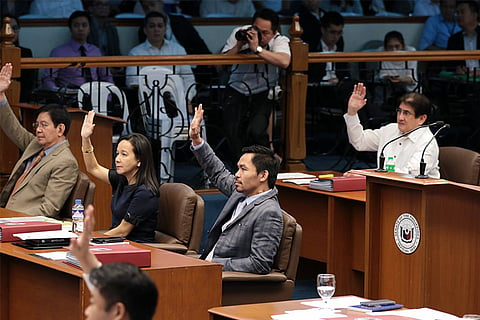Duterte set to sign Philippine national ID law
Official hints at presidential seal for bill outlining universal identification document in the coming weeks

Manila: Philippines President Rodrigo Duterte is expected to sign in the coming weeks a landmark legislation that will provide Filipinos with a universal identification card.
“I’m hopeful that the bill will be passed into law as early as next week,” budget secretary Benjamin Diokno said during a recent press briefing in Manila where the passage of the bill by the Senate was also announced.
Diokno said he had high hopes that Duterte would sign the National ID Law before Easter.
Last March 14, the Philippine Senate passed the Philippine Identification System Act of 2018 after parallel bills calling for a national ID system spent years pending approval by both chambers of Congress (the Senate and House of Representatives).
The Senate version of the National ID Act Senate Bill 1738 had been sponsored by Senator Panfilo Lacson.
“There were two dominant schools of thought promoting the national ID. There is the security community who believes that it can aid in policing. There are our economic managers who think that such an ID will plug the leaks in the use of government services. In other words, security and savings had been the primary concern of these measures. To these, the Senate injected a third and better perspective: service, a card that will serve the people,” said Senator Ralph Recto.
The House of Representatives had already approved the bill months ago.
The Philippines had lagged behind its neighbours in coming up with a national identification system.
Socioeconomic planning secretary Ernesto Pernia said despite the numerous ID cards issued by the government in in the Philippines, 14 per cent of Filipinos are denied of government and other financial services due to a lack of proper identification documents he said citing a recent study of the World Bank’s ID for Development group (ID4D). He said a universal ID card will address this concern.
“No matter how good a programme is in principle, the government fails when people, especially the poor, cannot access it simply because they cannot present any ID,” Pernia noted.
The implementation of the country’s first ever national identification system will be pivotal in ensuring that every Filipino and resident can have access to public services and development opportunities, according to him.
He said the World Bank study was based on data collected from November 2017 to February 2018 through interviews, field visits, and desk research.
“Results of the study also show that the Philippines’ identity landscape is fragmented, inefficient and duplicative with at least 25 functional ID systems, many of which are paper-based.
“A common ID used by Filipinos apart from birth certificates and voter’s ID is the passport, back-office processing requirement of which are twice and thrice costlier than in Thailand and Indonesia, respectively,” the study adds.
“We need a system that will unify all government IDs to facilitate citizens’ transactions with government and even with the private sector. Hence, a national ID system can open up opportunities especially for the poor and marginalised and will make public service delivery more efficient,” Pernia said.
Pernia also noted how the new ID system is crucial in making sure that poor households that will be affected by the newly implemented tax reform law will receive the government’s tax safety nets.
Sign up for the Daily Briefing
Get the latest news and updates straight to your inbox



